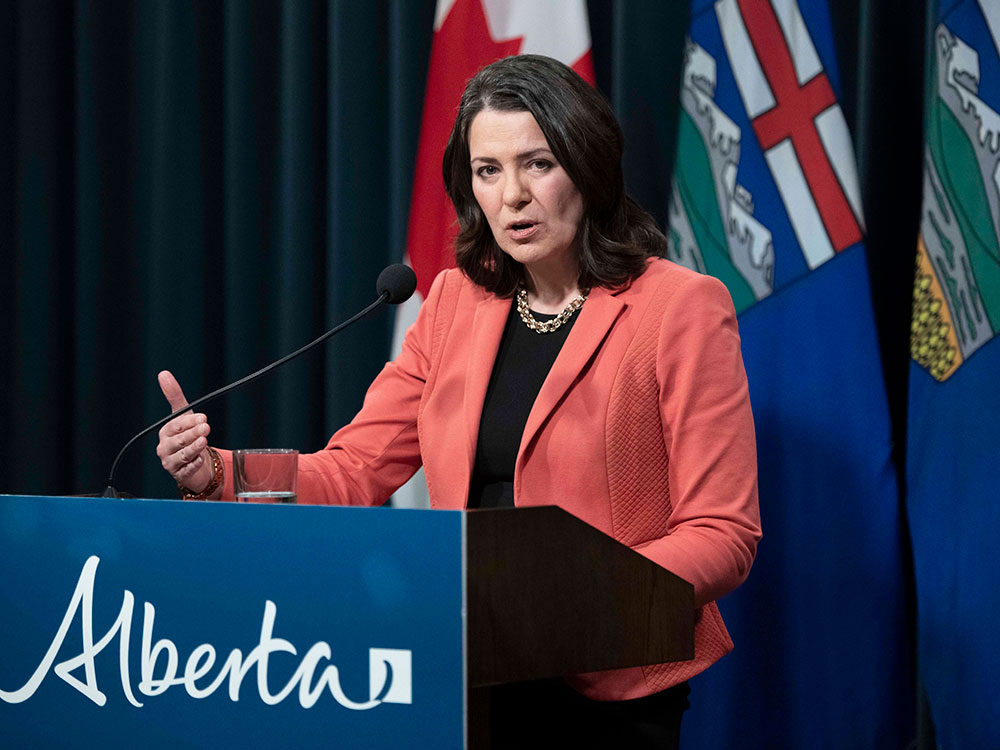No sooner did the federal Liberal and New Democratic parties say they’d reached a deal on a national pharmacare program, than Alberta’s United Conservative Party government insisted it wanted no part of the plan.
Never mind that the Liberals and NDP said the details of the plan they’ve agreed to will be made public this week.
As Chris Gallaway, director of Alberta’s Friends of Medicare, said in a statement Monday morning, “by pre-empting their decision on pharmacare even before the federal announcement is made, Danielle Smith’s government has made it clear they would rather play politics than get things done to help Albertans.”
Physician Luanne Metz, the NDP’s health critic, observed that “instead of embracing the new program, Danielle Smith has predictably rejected it out of hand, before understanding any details.”
“Instead of welcoming assistance for Albertans who are suffering from the affordability crisis, the UCP has continued its schoolyard scrap with the federal government and is bowing to pressure from lobbyists,” Metz, the MLA for Calgary-Varsity, said in a news release.
Both observations seem fair, since the UCP position, as far as anyone can understand it, is just send us the money and we’ll… do something with it. This is predicated, presumably, on the desire not to give the Trudeau government credit for anything, no matter how helpful.
While it may not be not entirely clear from what the UCP had to say, it’s pretty easy to put together a number of reasons the Smith government might object to a national plan that would save lives, make life easier for Canadians with medical needs, and save taxpayers billions of dollars on pharmaceutical costs.
According to a Global News story, one of Alberta Health Minister Adriana LaGrange’s media minions complained that Alberta wasn’t consulted about the national drug coverage plan and “there are limitations in the initial analysis and assumptions, including startup investment and administrative costs to implement a cost-sharing model, that were not taken into consideration that add costs for the provinces.”
But what does that even mean? It’s certainly not clear what the limitations the government has in mind might be, especially since we don’t yet know the nitty-gritty details of the plan.
As for not sharing the details with Alberta, those details were subject to negotiation between the federal Liberals and NDP until last week. And all the Alberta government would have done anyway, as its uninformative statement shows, is try to throw a spanner in the works.
The statement from the health minister’s office, according to Global, also says that “all Albertans already have access to government-sponsored health benefit plans, which include drug coverage.
That’s pretty cheeky when so many don’t. Or, as Gallaway put it, it’s “deliberately misleading” and “belies the fact that one in five Canadian households still cannot afford to fill their prescriptions.”
“To claim that all Albertans have access to drug coverage because they can buy a benefit plan if they can afford one is… beyond offensive,” he said.
“Canada currently pays some of the highest drug costs in the world, and millions are struggling to afford the medications that they need,” Gallaway explained. “It is well-documented that moving to a national, single-payer pharmacare plan would save governments, employers, Albertans and our provincial health-care systems billions of dollars per year. And most importantly it would save countless lives.”
“Removing barriers to access these medications will not only help individuals but also reduce the health-care costs that we all pay,” the NDP’s Metz observed. “Drug costs will be reduced through massive national buying power.”
All true, but there are doubtless other reasons for the UCP recalcitrance as well.
After all, the Smith government is actively campaigning to get a Pierre Pollievre government elected in Ottawa, and anything that makes the Liberals and the NDP look good with voters concerned about the cost of living in 21st-century Canada is bound to be resisted by the UCP.
This is especially so as the agreement on pharmacare meets the March 1 deadline to table legislation and allows the supply and confidence agreement between the two parties that is propping up the Liberal minority to survive.
Remember, Poilievre, the eminently dislikable federal Conservative leader, is likely to see his lead in the polls shrink as time goes on. Whether or not it shrinks enough to change the Conservatives’ chances of forming a majority government, which seems likely now, is of course a question that obsesses political analysts of all stripes.
Then there is the matter of the UCP’s (and the federal Conservative party’s) social conservative base, rife with opposition to women’s reproductive rights, populated by men who think a woman’s place is pregnant and in the kitchen, and suspicious of any program that would redistribute wealth in any way.
The fact the program would cover the cost of birth control medication, in addition to diabetes treatments and equipment, is hardly a selling point in modern Canadian Conservative circles.
Finally, if past practice is anything to go by, the Smith government is listening carefully to what lobbyists want — and Big Pharma most definitely doesn’t want pharmacare.
So it was inevitable the UCP would drag its feet in hopes of scuttling the plan, or at least delaying it until a Poilievre government could be sworn in to do the scuttling for it.
“Once again, the UCP has proven that they do not take women’s health seriously by opposing a national pharmacare program that would ensure access to contraception,” said NDP status of women critic and Calgary-Edgemont MLA Julia Hayter. “In the midst of the worst affordability crisis we have faced in a generation, one that disproportionately impacts women, the UCP has dug in its heels on a program that would help.”
As for what Alberta would do with the money if the feds were so foolish as to just fork it over, it is profoundly to be hoped that will remain a mystery. ![]()
Read more: Health, Federal Politics, Alberta

















Tyee Commenting Guidelines
Comments that violate guidelines risk being deleted, and violations may result in a temporary or permanent user ban. Maintain the spirit of good conversation to stay in the discussion and be patient with moderators. Comments are reviewed regularly but not in real time.
Do:
Do not: